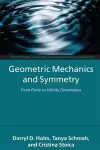
Geometric Mechanics and Symmetry
3 authors - Paperback
£64.00
Darryl D Holm spent thirty four years at Los Alamos National Laboratory before moving in 2005 to Imperial College London as Professor of Applied Mathematics. During his career, Darryl developed a wide range of applications of the geometric approach to dynamical systems. His main interest is in deriving and analyzing nonlinear evolution equations for multiscale phenomena. Applications of these equations have ranged from nonlinear optical pulses used in telecommunications, to turbulence modeling for global ocean circulation and climate prediction, to template matching for the shapes of biomedical images, to directed self-assembly in nanoscience. The solution behavior of these equations includes solitons (governed by the Camassa-Holm equation), vortices and turbulence (modelled by the LANS-alpha equation) and emergent singularities (modelled by the EPDiff equation) representing the sharp edges that appear in biomedical images. Tanya Schmah completed her PhD in mathematics in 2001 at the Swiss Federal Institute of Technology in Lausanne. She has held lectureships at the University of Warwick (U.K.) and Macquarie University (Australia), and is currently working in the Department of Computer Science at the University of Toronto. She has a wide range of interests in mathematics and computer science, including symmetric Hamiltonian systems and machine learning. Cristina Stoica has a Diploma in Mathematics-Mechanics from the University of Bucharest (1991) and possesses a Doctor of Sciences degree in Astronomy awarded by the Astronomical Institute of the Romanian Academy (1997). She also holds a PhD in Applied Mathematics from the University of Victoria, Canada (2000). Currently she is a faculty member at Wilfrid Laurier University, Canada. Her main interests lie at the intersection of dynamical systems and mathematical physics.